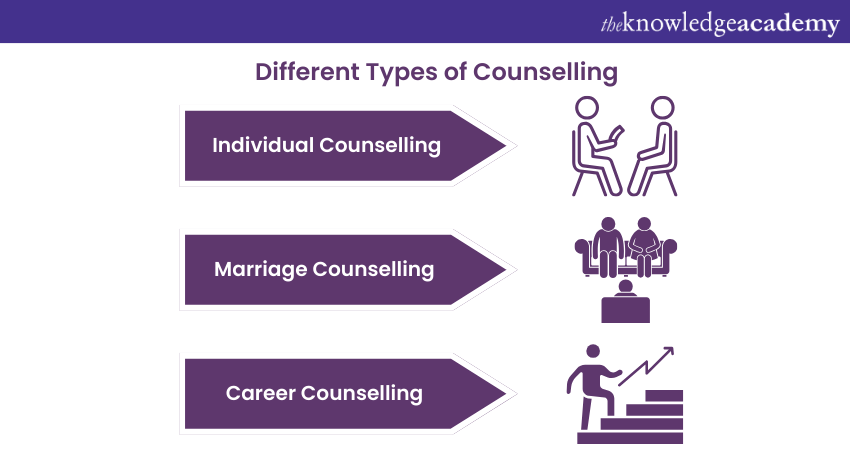A Comprehensive Guide to the Different Kinds Of Coaching and Their Impact
Counseling includes a selection of therapeutic methods, each created to fulfill unique mental health and wellness demands. From the organized techniques of Cognitive-Behavioral Therapy to the empathetic nature of Person-Centered Therapy, these techniques use distinctive pathways to personal growth. Household treatment and Dialectical Behavior modification give added frameworks for healing, while group counseling fosters community support. Understanding these diverse methods can brighten their extensive effect on private wellness. What stays to be discovered are the details of each strategy.

Understanding Cognitive-Behavioral Therapy (CBT)
Although lots of therapeutic techniques exist, Cognitive-Behavioral Therapy (CBT) attracts attention due to its organized, ambitious nature. This form of therapy is based upon the property that thoughts, feelings, and behaviors are interconnected, and by altering adverse thought patterns, individuals can change their psychological responses and actions. CBT utilizes numerous strategies, such as cognitive restructuring, which helps customers identify and challenge distorted beliefs. Behavior activation urges involvement in pleasant activities to deal with clinical depression.
Generally, CBT is a short-term treatment, typically enduring in between 12 to 20 sessions, making it accessible for those seeking quick results. Its effectiveness has been well-documented in treating stress and anxiety conditions, anxiety, and various other psychological health issues. The specialist's role is to direct clients through exercises and homework assignments, fostering self-awareness and advertising long-term coping strategies. This practical approach empowers people to take control of their psychological wellness, eventually causing enhanced life contentment.
Discovering Person-Centered Therapy
Person-Centered Treatment, established by Carl Rogers, provides a contrasting approach to Cognitive-Behavioral Treatment by stressing the client's subjective experience. This therapeutic model focuses on the person's perspective, promoting an environment of compassion, genuine positive regard, and credibility. By enabling clients to discover their sensations and thoughts without judgment, specialists assist in personal growth and self-discovery.
The core tenet of Person-Centered Treatment is the idea that individuals have the intrinsic capacity for self-healing and individual advancement. In this setting, the specialist serves as a supportive overview as opposed to a directive authority, urging clients to organize their very own journey. This strategy is especially effective for those facing problems such as reduced self-confidence, anxiety, or depression, as it encourages them to confront and recognize their emotions. Inevitably, Person-Centered Therapy grows a strong restorative alliance, promoting trust and visibility crucial for significant adjustment.
The Role of Family Members Therapy in Healing
Family members therapy works as an important element in the recovery process for people and their relationships. This restorative approach concentrates on boosting communication, solving conflicts, and promoting much deeper links among relative. By dealing with inefficient dynamics, family therapy motivates each member to view it now reveal their thoughts and sensations in a safe setting, advertising understanding and compassion.

The impact of household treatment prolongs past the sessions, as improved partnerships can lead to improved psychological well-being for all included. Overall, household treatment plays a vital function in recovery by promoting unity, resilience, and shared assistance among relative, ultimately directing them towards a healthier, more satisfying life together.
Unboxing Dialectical Behavior Modification (DBT)
Building on the foundation of restorative strategies that enhance emotional wellness, Dialectical Behavior modification (DBT) supplies an organized structure for individuals having a hard time with extreme feelings and behavior obstacles. Developed see this website by Marsha Linehan, DBT integrates cognitive-behavioral methods with mindfulness methods, intending to aid customers take care of overwhelming feelings and enhance interpersonal efficiency.
The treatment is specifically advantageous for those identified with Borderline Character Condition however is likewise relevant to a series of other mental health issues. virtual therapy. DBT includes individual treatment sessions and abilities training teams, concentrating on 4 crucial ability: mindfulness, distress tolerance, emotion regulation, and interpersonal performance
The Advantages of Team Therapy Sessions
While private therapy provides valuable understandings, team therapy sessions use one-of-a-kind advantages that can considerably improve the therapeutic experience. One important benefit is the feeling of neighborhood that emerges amongst individuals. Individuals frequently discover comfort in sharing their experiences with others facing comparable difficulties, promoting a supportive setting that minimizes feelings of seclusion.
In addition, group sessions encourage varied point of views, enabling participants to pick up from each various other's coping techniques and insights. This collective knowledge can cause enhanced analytic capabilities and a broader understanding of individual issues.
Furthermore, group therapy frequently advertises accountability, as participants encourage one an additional to seek their goals and stick to their commitments. Ultimately, the cost-effectiveness of group treatment makes it an easily accessible option for lots of individuals Get More Information seeking assistance. Overall, the collective nature of team counseling sessions can substantially enrich the restorative trip.
Frequently Asked Inquiries
What Certifications Do Specialists Required to Practice Counseling?
Specialists typically need a pertinent degree in psychology or counseling, in addition to monitored clinical experience. Furthermore, they must acquire ideal licensure or certification to practice lawfully, making certain adherence to professional requirements and honest standards.
Just how Do I Choose the Right Type of Therapy for Me?
Selecting the best kind of treatment entails reviewing personal needs, exploring different strategies, considering therapist specialties, and seeking recommendations. Understanding specific objectives and choices can substantially boost the effectiveness and fulfillment of the healing experience.

Are Online Therapy Procedure as Effective as In-Person Ones?
The effectiveness of on-line counseling sessions contrasted to in-person ones usually depends upon specific preferences and circumstances. Research study indicates that both techniques can yield positive results, though some may discover better convenience in face-to-face interactions.
Exactly How Long Does Counseling Typically Last?

What Should I Anticipate Throughout My Very First Counseling Session?
Throughout the first therapy session, customers can expect an intro, discussion of their concerns, facility of goals, and an overview of the therapy process - low cost therapy. This first conference aims to develop rapport and warranty comfort